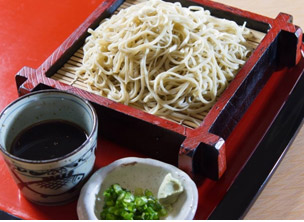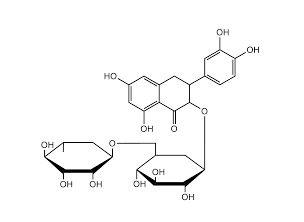What is Soba (fagopyrum spp.)?
- HOME
- What are functional plants?
- What is Soba (fagopyrum spp.)?
- What are functional plants?
- What is Chlorella?
- What is Eleuthero?
- What is Agaricus?
- What is Soba (fagopyrum spp.)?
- What is Mulberry?
Soba (fagopyrum spp.) is used as food in the world
Soba (fagopyrum spp.) is the yearly plant of Polygonaceae, and it is a widely utilized as traditional food. It has been accepted widely that the origin of Soba (fagopyrum spp.) is the south of China. In Japan, fagopyrum pollen was detected at remains of the end of Zyomon and Yayoi period. It shows that Soba (fagopyrum spp.) has been used from olden days.
Ancient Japanese ate sobagaki and sobamochi, made from Soba (fagopyrum spp.). It is said that the recent eating style was established in Edo era. "Ryori Monogatari", the first Japanese recipe book published in 1643, provides the method for cutting buckwheat dough. Russia, China and Ukraine have large production and consumption of soba in the world.

Soba (fagopyrum spp.) is a nutritious food.
Soba (fagopyrum spp.) is rich in protein, and it contains plenty of amino acid lysine compared to other grain. Therefore, soba protein has 100 points of an amino acid score, and it is higher than that of other grain. (an amino acid score indicates the nutritional value of protein.)
Furthermore, it is known that Soba (fagopyrum spp.) is rich in dietary fiber, vitamins (B1 and B2 etc.) and mineral such as potassium.

The functional ingredients of Fagopyrum spp.
Soba (fagopyrum spp.) is rich in rutin, one of flavonoid.
Rutin provides an anti-oxidant action, enhance the resistance of capillary and prevent a brain hemorrhage caused by high-blood pressure.
In recent years, Fagopyrum tataricum, which contains a lot of rutin, is more richly cultivated than Fagopyrum esculentum.
Moreover, it is reported that Fagopyrum protein decrease the blood cholesterol.

The functionality of Soba (fagopyrum spp.)
The following functions are reported.
・decreasing the blood cholesterol
・neuroprotective effect
・antitumor action
・anti-inflammatory action
・hypoglycemic effect
・hypotensive action
・improving the circulation of blood
・immunopotentiative action
・antioxidative effect, etc.
References
- Kiyokazu Ikeda, Buckwheat as Traditional Food and Probing Its Beneficial Effects on Human Health, J Jpn Soc Nutr Food Sci 2002, 55, 295-297.
- Gimenez-Bastida JA, Zielinski H, Buckwheat as a Functional Food and Its Effects on Health, J Agric Food Chem 2015;63(36):7896-913.

